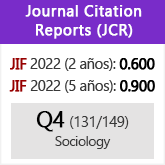La percepción del proceso político por parte de los ciudadanos. Una evaluación crítica de la consistencia de las preferencias y las preguntas de encuesta
DOI:
https://doi.org/10.3989/ris.2012.01.29Palabras clave:
Democracia directa, Democracia furtiva, Democracia representativa, Preferencias ciudadanas, Toma de decisiones políticasResumen
El estado actual de las investigaciones no nos dice mucho sobre las expectativas de los ciudadanos con respecto a la toma de decisiones políticas. La mayoría de las encuestas permiten que quienes las responden evalúen cómo funciona el sistema actual, pero no preguntan por procedimientos alternativos de decisión política. La falta de preguntas de encuesta contrastadas se puede explicar tanto por el hecho de que los cambios en los procedimientos de toma de decisiones han resultado difíciles de prever, como por el escepticismo general con respecto a la capacidad de las personas para formarse una opinión sobre estos asuntos. Los procesos políticos son, sin duda, asuntos complejos que no se prestan bien a preguntas simplistas de encuesta. Además, los estudios previos han demostrado convincentemente que la mayoría de la gente tiene dificultades en general para adoptar una actitud única, estable y coherente que tenga que ver con asuntos políticos incluso mucho más directos. Para determinar si el hecho de intentar captar las actitudes hacia la toma de decisiones políticas en futuros estudios empíricos es una empresa fructífera, este estudio pretende valorar críticamente hasta qué punto la gente expresa preferencias coherentes sobre estos asuntos, y si esas preferencias están en consonancia con lo que se esperaba en las dispersas investigaciones previas. Este estudio se basa en la Encuesta Electoral Finlandesa de 2011, un estudio que, a diferencia de la mayoría de los estudios electorales, incluye una rica variedad de preguntas de encuestas sobre este tema y utiliza una combinación de estrategias para buscar algún patrón en la opinión de los ciudadanos.
Descargas
Citas
Achen, C. 1975. "Mass Political Attitudes and the Survey Response." American Political ScienceReview. 69:1218-31. http://dx.doi.org/10.2307/1955282
Alvarez, R. Michael and J. Brehm 1995. "American Ambivalence Towards Abortion Policy: Development of a Heteroskedastic Probit Model of Competing Values." American Journal of Political Science 39: 1055-1082. http://dx.doi.org/10.2307/2111669
Anderson, C. and E. Goodyear-Grant. 2010. "Why are highly informed citizens sceptical of referenda?" Electoral Studies 29:227-238. http://dx.doi.org/10.1016/j.electstud.2009.12.004
Bengtsson, Å. and M. Mattila. 2009. "Direct Democracy and its Critics: Support for Direct Democracy and ‹Stealth› Democracy in Finland." West European Politics 32(5):1031-1048. http://dx.doi.org/10.1080/01402380903065256
Bowler, S., Todd D. and J. A. Karp. 2007. "Enraged or Engaged? Preferences for Direct Citizen Participation in Affluent Democracies." Political Research Quarterly 60(3):351-362. http://dx.doi.org/10.1177/1065912907304108
Converse, P. E. 1964. "The Nature of Belief Systems in Mass Publics." Pp. 206-261 In Ideology and Discontent edited by Apter, David. New York: Free Press.
Craig, S. C., Martinez, M. D. Kane J. G. and J. Gainous. 2005. "Core Values, Value Conflict, and Citizens' Ambivalence about Gay Rights." Political Research Quarterly 58(1):5-17.
Dalton, R. J. 2004. Democratic Challenges, Democratic Choices. The Erosion of Political Support in Advanced Democracies. Oxford: Oxford University Press. http://dx.doi.org/10.1093/acprof:oso/9780199268436.001.0001
Dalton, R. J., Bürklin W. and A. Drummond. 2001. "Public Opinion and Direct Democracy." Journal of Democracy 12(4):141-153. http://dx.doi.org/10.1353/jod.2001.0066
Donovan, T. and J. A. Karp. 2006. "Popular Support for Direct Democracy." Party Politics 12(5): 671-688. http://dx.doi.org/10.1177/1354068806066793
Fleishman, J. A. 1986. "Types of Political Attitude Structure: Results of a Cluster Analysis." The Public Opinion Quarterly 50(3):371-386. http://dx.doi.org/10.1086/268990
Hibbing, J. R. and E. Theiss-Morse. 2002. Stealth Democracy. Americans' Beliefs about How Government Should Work. Cambridge: Cambridge University Press. http://dx.doi.org/10.1017/CBO9780511613722
Hochschild, J. 1981. What's Fair? American Attitudes toward Distributive Justice. Cambridge: Harvard University Press.
Lacy, D. 2001. "A Theory of Nonseparable Preferences in Survey Responses." American Journal of Political Science 45(2): 239-258. http://dx.doi.org/10.2307/2669339
Lavin, H. 2001. "The Electoral Consequences of Ambivalence toward Presidential Candidates." American Journal of Political Science 45(4):915-929. http://dx.doi.org/10.2307/2669332
Levin, T. R and C. R. Hullett. 2002. "Eta Squared, Partial Eta Squared, and Misreporting of Effect Size in Communication Research." Human Communication Research 28(4):612-625. http://dx.doi.org/10.1111/j.1468-2958.2002.tb00828.x
Neblo, M. A., Esterling, K. M., Kennedy, R. P., Lazer, David M.J. and A. E. Sokhey. 2010. "Who Wants To Deliberate - And Why?." American Political Science Review 104(3):566-583. http://dx.doi.org/10.1017/S0003055410000298
Norris, P., eds. 1999. Critical Citizens. Global Support for Democratic Governance. Oxford: Oxford University Press.
Saris, W. E., Revilla, M., Krosnick J. A. and E. M. Shaeffer. 2010. "Comparing Questions with Agree/ Disagree Response Options to Questions with Item-Specific Response Options." Survey Research Methods 4(1): 61-79.
Steenberger, M. R. and P. R. Brewer. 2000. "The Not-So-Ambivalent Public. Policy Attitudes in the Political Culture of Ambivalence." Pp. 93-129 in The Issue of Belief: Essays in the Intersection of Non-Attitudes and Attitude Change edited by Willhem E. Saris and P. M. Sniderman. Cambridge: University Press.
Tourangeau, R., Rips, L. J. and K. Rasinski. 2000. The Psychology of Survey Response. Cambridge: Cambridge University Press. http://dx.doi.org/10.1017/CBO9780511819322
Zaller, J. R. 1992. The Nature and Origins of Mass Opinion. Cambridge: Cambridge University Press. http://dx.doi.org/10.1017/CBO9780511818691
Zaller, J. R. and S. Feldman. 1992. "A Simple Theory of the Survey Response: Answering Questions versus Revealing Preferences." American Journal of Political Science. 36(3):579-616. http://dx.doi.org/10.2307/2111583
Descargas
Publicado
Cómo citar
Número
Sección
Licencia
Derechos de autor 2012 Consejo Superior de Investigaciones Científicas (CSIC)

Esta obra está bajo una licencia internacional Creative Commons Atribución 4.0.
© CSIC. Los originales publicados en las ediciones impresa y electrónica de esta Revista son propiedad del Consejo Superior de Investigaciones Científicas, siendo necesario citar la procedencia en cualquier reproducción parcial o total.Salvo indicación contraria, todos los contenidos de la edición electrónica se distribuyen bajo una licencia de uso y distribución “Creative Commons Reconocimiento 4.0 Internacional ” (CC BY 4.0). Puede consultar desde aquí la versión informativa y el texto legal de la licencia. Esta circunstancia ha de hacerse constar expresamente de esta forma cuando sea necesario.
No se autoriza el depósito en repositorios, páginas web personales o similares de cualquier otra versión distinta a la publicada por el editor.

















